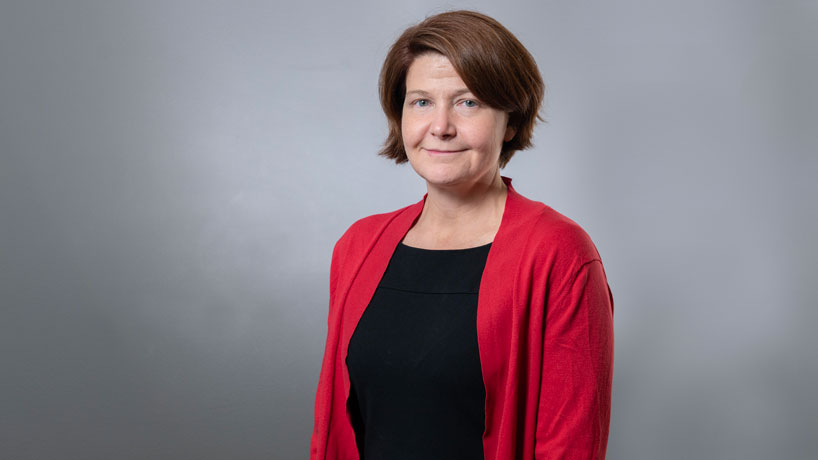
Lee Slocum, a professor of criminology and criminal justice, has been leading a team of researchers studying people’s feelings of community safety with the support of a grant from the MacArthur Foundation. (Photo by Derik Holtmann)
Criminologists eagerly await the annual release of the FBI’s Uniform Crime Report so they can have reliable data on the prevalence of crime in cities across the United States. But those numbers don’t say much about how people actually feel about their safety living in their own communities. University of Missouri–St. Louis Professor Lee Slocum has been leading a team of researchers trying to dig deeper than the statistics through a grant from the John D. and Catherine T. MacArthur Foundation’s Safety and Justice Challenge. Their work has centered on the experiences of people in St. Louis County as well as Missoula County in Montana and Mecklenburg County, which contains Charlotte, in North Carolina.
1. What have you learned about people’s perceptions of safety in their own communities?
When people talk about community safety, a priority obviously is low rates of crime and personal safety and security. But once you move past that, people quickly turn to things that we call social and economic justice, so housing, access to food, access to clean water and air, low rates of inequality, having basic needs met. Also, people would talk about things like the government and their role in this. The expansiveness with which people talked about safety was kind of surprising.
2. How have these perceptions evolved recently?
I think in the last 10 years, particularly with George Floyd in Minneapolis and certainly here in Ferguson, people have been thinking more about what community safety looks like. I think people have always known that you can’t rely on police to have a safe community. They can’t be everywhere, and people don’t want them everywhere, and they don’t want to be everywhere. So that’s led to more people thinking about how we can have a safe community that relies on the community versus just the criminal legal system.
3. What other factors come into play?
We were also thinking about how the meaning of safety varies across different communities, depending on things like people’s experiences with the criminal legal system or their experiences with victimization or even things like whether they live in a rural or urban environment.
4. How were some of those differences reflected in this study?
Missoula has a very different gun culture than a place like St. Louis or Mecklenburg County, so the way they thought about guns was very different than the way people talked about guns here. They also put social and economic justice above all the other things. I found that to be pretty surprising. It may be because they have lower rates of crime there, and it’s a liberal college town.
5. What got you interested in studying police-community relations?
I come from a long line of police officers, and I swore I would never study the police or do anything with police for that reason, but they’re the main face of not only the legal system but the government as well. I’m interested in how people mobilize the law. When people need assistance, where do they go? Why do some people choose to use something like the formal legal system, like police, and why do other people choose to rely on self help – turning to your neighbors or a friend or in some places resorting to violence if they don’t have any other options?
This story was originally published in the fall 2023 issue of UMSL Magazine. If you have a story idea for UMSL Magazine, email magazine@umsl.edu.














